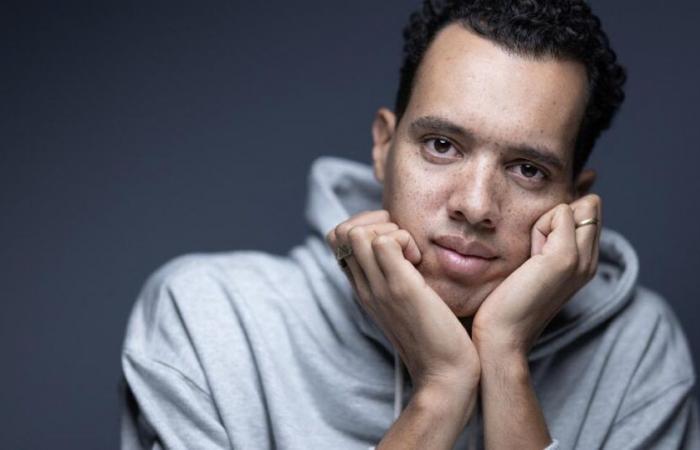The 42-year-old Franco-Rwandan rapper wins with a committed novel about Rwanda where he lives with his wife and their daughters.
Gaël Faye or Kamel Daoud? Just last week, the predictions were going well all over Paris. There was speculation that there would be a duel between the two authors. If one had the Goncourt, the other must have the Renaudot. This is now done. At 12:45 p.m., the 122e Goncourt Prize was awarded in the first round, to Kamel Daoud for Houris at Gallimard and the Renaudot prize, through the voice of Jean-Marie Gustave Le Clézio, its president for this 2024 edition, was awarded to Gaël Faye for Jacaranda published by Grasset. The Renaudot Essai prize was awarded to Sébastien Lapaque and the Renaudot Poche prize to Serge Rezvani, for Les Années-lumière, (Fugues collection by Philippe Rey).
Until the end, we believed in Faye winning the Goncourt prize. He also seemed to have the ideal profile: popular author, poet and slammer, best seller since his first novel adapted for cinema, theater and comics. However, despite the rumors, even Grasset didn't believe it. When we asked him the question “Can Faye win the Goncourt?” the publishing house responded defeatist: “Everyone says Daoud”. She remembered that in 2016, Gaël Faye had already appeared in the final Goncourt list for his first novel “Small country” and finally left empty-handed (with the Goncourt prize for high school students all the same!) facing, already, a Gallimard author. And then, Jacaranda did not need Goncourt to find its place in bookstores: since its release in August, the novel has sold 173,000 copies, with certain weeks peaking at 20,000 copies. Regardless, the Renaudot prize is a great prize, which rewards a very young work but also a publishing house. With JacarandaGrasset wins his 3rd Renaudot prize. The latest was Simon Liberati in 2022.
Also read
Kamel Daoud wins the 2024 Goncourt prize with Houris
A consecration for Grasset therefore, but also for its 42-year-old author, who is therefore only writing his second novel. Precision is important when we know that jurors are very sensitive to it. In 2017, Olivier Guez won the Renaudot prize with The Disappearance of Josef Mengele (Grasset) and in 2018, Valérie Manteau won it with The Furrow (The Tripod). However, by his own admission, Gaël Faye does not consider himself a writer. And this, despite the incredible success of his first novel Small Countrytranslated into 45 languages, sold more than a million copies, adapted for cinema, a play and a comic strip.
This is what makes the author so charming. 1m93 of humility and poetry. Born in 1982 in Burundi, to a Rwandan mother and a French father, Gaël Faye arrived in France at the age of 13 in the Paris region. A good student, fan of hip-hop and rap, he first went into exile in London for work before returning to his first love: music. When he is not in bookstores, Faye is a rapper, composer, performer. Successful too (he notably won scene revelation of the year at the 2018 Victoires de la Musique). Far from the race for German publication, Faye took her time (eight years) to write Jacaranda. A novel inspired by his own life and his links with Rwanda, in which he analyzes the reconstruction of this country, traumatized by the genocide of the Tutsi in 1994. Coincidence of the calendar? The year 2024 marks the thirtieth anniversary of the commemorations of this massacre.
His story: April 1994. Milan is 12 years old and lives in Versailles between a French father and a Rwandan mother who never spoke to him about his country or his family. One day, however, Rwanda enters their lives. A 12-year-old boy stands in the middle of the living room, ribs exposed, a thick bandage on his shaved head. Claude was injured during the war. Milan makes him his brother but the child has already been sent home. The years pass, and so do the memories.
It is July 1998. Milan's mother offers to accompany him to Rwanda. There, the teenager discovers that he has a grandmother and a young uncle who survived the genocide. He meets another survivor, a childhood friend of his mother, who lost her four children in the massacres, has just had a baby and finds young Claude. At the beginning of the book, Milan looks at Kigali with European eyes. “Rows of dirty and sewage flowed between the houses with tin roofs, plastic bags lying in the gutters. » Claude enrage. “You come here as a tourist and you will leave thinking you had a good vacation. But we don't come on vacation to a land of suffering. This country is poisoned. We live with killers around us and it drives us crazy. » Milan unlearns what he thinks he knows. And the years pass. Milan will return to Rwanda. When he is a law student, to write a dissertation on the popular tribunals responsible for judging genocidaires. Then, like the author, he will settle there permanently.
“It’s not an autobiographical book,” Gaël Faye explained to L’Humanité. I am very far from Milan, the hero. There are of course some elements from my own life. It is a work woven from real and probable facts. » Milan watches, listens, takes notes, he describes the difficult reconstruction of a country which lives three months a year in mourning when it commemorates the massacres of 1994. In its August 29 issue, Le Figaro wrote: “Through a well-scripted narration, Gaël Faye attempts to compose a fair and nuanced picture of Rwandan society and its past, diving into the origins of violence – a long story evoked through the memories of old Rosalie, born in 1895, who knew the court of the kings of Rwanda, a character whose life would deserve a novel-length novel in itself. »






